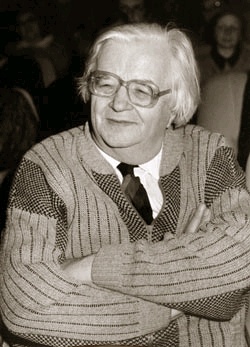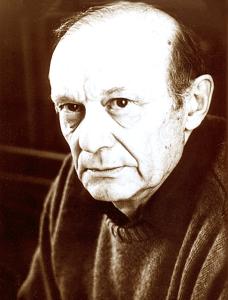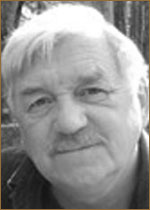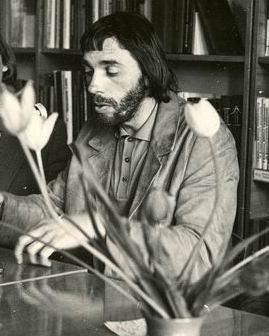Title of the work
Studio / Production Company
Country of the First Edition
Country/countries of popularity
Original Language
First Edition Date
First Edition Details
Герон [Heron of Alexandria (Geron)]. Directed by Viktor Omelchenko. Script by Leonid Likhodeev. Composer Eduard Artemyev. Moscow: Studio Ekran, 1979, 15 min 23 sec.
Running time
Genre
Animated films
Instructional and educational works
Short films
Stop-motion animation films
Target Audience
Crossover (Youth 6+)
Cover

We are still trying to obtain permission for posting the original cover.
Author of the Entry:
Hanna Paulouskaya, University of Warsaw, hannapa@al.uw.edu.pl
Peer-reviewer of the Entry:
Elżbieta Olechowska, University of Warsaw, elzbieta.olechowska@gmail.com
Elizabeth Hale, University of New England, ehale@une.edu.au
Eduard Artemyev
, b. 1937
(Composer)
Eduard Artemyev (Эдуард Артемьев) is a Russian composer of electronic music and music for feature, documentary and animation films. He studied at the Moscow State Tchaikovsky Conservatory (1960). He wrote electronic compositions in 1960s and 70s being part of the experimental avant-garde. In 1990 he organised and led the Russian Association of Electronic Acoustical Music. Recipient of many awards, Honoured Artist of the RSFSR (1999).
Sources:
Katunyan, Margarita. “Edward Artemiev”, electroshock.ru (accessed: July 16, 2019)
Profile at animator.ru (accessed: July 16, 2019)
Profile at kino-teatr.ru (accessed: July 16, 2019)
Bio prepared by Hanna Paulouskaya, University of Warsaw, hannapa@al.uw.edu.pl

Portrait of Valentin Berestov. Courtesy of Marina Valentinovna Berestova, the daughter of the poet.
Valentin Berestov
, 1928 - 1998
(Author)
Valentin Berestov (Валентин Берестов) was a Russian writer, poet, translator and researcher. He was especially prolific in writing for children and young adults. He was a friend of Korney Chukovsky, Anna Akhmatova, Lidia Chukovskaya, Nadezhda Mandelstam.
Valentin Berestov studied history and archeology at the Moscow State University (1951) and made a PhD in ethnography at the Academy of Sciencies of the USSR (1955). He worked for many years as an archeologist and ethnographer.
He stared to write prose and poems in 1946. Recipient of many awards, especially for his poetry for children.
Sources:
Profile at kino-teatr.ru (accessed: July 16, 2019)
Official website (accessed: July 16, 2019)
Bio prepared by Hanna Paulouskaya, University of Warsaw, hannapa@al.uw.edu.pl

Portrait of Leonid Likhodeev — courtesy of the web-site kino-teatr.ru (accessed: July 16, 2019).
Leonid Likhodeev
, 1921 - 1994
(Screenwriter)
Leonid Likhodeev (Леонид Лиходеев), real name Lides (Лидес), was a writer, poet, screen-writer, satirist and journalist of Jewish origin. WW2 veteran. He was born in Yuzovka (Donetsk), and studied at the University of Odessa (1941) and at the M. Gorky Literary Institute in Moscow (1952). He wrote for many literary journals, TV and cinema, including popular stories for children and young adults.
Sources:
Profile at lixodeev.ru (accessed July 16, 2019)
Profile at donjetsk-jewish.ucoz.ru (accessed July 16, 2019)
Profile at animator.ru (accessed July 16, 2019)
Profile at kino-teatr.ru (accessed July 16, 2019)
Bio prepared by Hanna Paulouskaya, University of Warsaw, hannapa@al.uw.edu.pl

Portrait of Viktor Omelchenko — courtesy of the web-site kino-teatr.ru (accessed: July 16, 2019).
Viktor Omelchenko (Director)
Viktor Omelchenko (Виктор Омельченко) is a Russian painter, animator and director of Ukrainian origin. He studied at the Moscow art school “In the memory of 1905” (1969) and at Gerasimov Institute of Cinematography in Moscow, Faculty of Movie Direction. From 1969 he worked at the TV Studio Ekran (founded in 1968), specialising in production of TV films and animations, especially for children and youth. He worked for the Очевидное-невероятное [Obvious and Unbelievable], popular science program; contributed to the Спокойно ночи, малыши! [Good Night, Little Ones] program (the most popular program for children including animations).
Sources:
Omelchenko, Viktor. “Искусство. Записки художника” [Art. Notes of an Artist], Smena 10 (2013), pp. 66-80.
Profile at animator.ru (accessed July 16, 2019)
Profile at kino-teatr.ru (accessed July 16, 2019)
Bio prepared by Hanna Paulouskaya, University of Warsaw, hannapa@al.uw.edu.pl
Adaptations
The script is based on a fragment of the non-fiction novel of Leonid Likhodeev Звезда с неба [A Star from the Sky] (1969).
Cf. Likhodeev, Leonid, Звезда с неба [A Star from the Sky], 2nd ed. Moscow: Detskaia literatura, 1983 (1st ed. 1969), 45–49.
Summary
The film is made as a cutout animation with elements of collage and hand-drawn animation. It describes the story of the mathematician Heron of Alexandria presenting him as a person ahead of his time. In the centre of the plot, there is an invention of a steam-powered device (aeolipile). The story is told by a narrator (the authors used the voice of Leonid Likhodeev, i.e., the actual script-writer of the film), who alternates it with fragments of poetry of Valentin Berestov. The main emphasis is put on the uniqueness of a dreamer who often does not belong to his time and looks like a stranger but creates things that are to be discovered “in some two thousand years”.* The film starts with a poem by Berestov:
Мы как-то позабыли про Герона,
А был он интересный человек.
Он проживал давно, во время оно,
Александрийский этот древний грек
Он был чудак,
Один на всей планете
Он подал нам,
Сегодняшним, пример
И возвестил за два тысячелетья
Пришествие эпохи НТР.
Somehow we have forgotten about Heron,
And he was such an exciting man.
He lived long ago, at a time so distant,
An ancient Greek from Alexandria
He was a freak,
As the only on the planet
He set an example
For us today.
He has foreseen that in two thousand years,
A digital revolution would come.
The narrator continues: “Everything in history begins with daily, elementary, routine things. I would say history begins every day. A customer comes in, brings a job, for example, to fix a kettle”, and the story of the steam-powered device begins. Heron is depicted as a person who was so immersed in his thoughts that he didn’t notice when he screwed the neck of the kettle to the wrong side, accidentally causing the kettle to work as a steam device. Heron’s imagination suggested to him designs for all contemporary machines, but he couldn’t convince others.
Герон не знал, что жил до нашей эры
И он не понял, почему тогда
Не стали турбоходами галеры
И не пошли по рельсам поезда.
Heron didn’t know he lived before our era
And he didn’t grasp why at that time
The galleys did not become turbo ships,
And the trains did not speed on tracks.
The narrator concludes that today there are also many Herons among us, who will be discovered “in some two thousand years.”
* All translations from Russian are done by the author of the entry.
Analysis
The film is very positive and inspiring. It encourages youth to be dreamers and to overcome the impossible, the limitations of the time we live in. Poetry makes the ideas more convincing and hopeful. The film looks like a hymn to the human mind.
Due to the film mixing ancient inventions with contemporary ones, antiquity looks very modern and attractive. We see that people two thousand years ago were the same as now, and the human mind can do wonders in whatever the epoch.
Understanding antiquity as a time of great inventions and scientific research was typical for Soviet culture. It was easier to find ancient figures in a textbook on mathematics or physics than on literature; and Lucretius could be recited during a physics class at a normal provincial school. Emphasizing scientific aspects allowed to diminish the role of mythology which was controversial in an anti-religious society. At the same time, such attitude made it possible to continue the ideas of Enlightenment or Renaissance and to build culture based on ancient Greek and Roman civilizations.
Further Reading
Likhodeev, Leonid [Лиходеев, Леонид], Звезда с неба [A Star from the Sky (Zvezda s neba)], 2nd ed., Moskva: Detskaia literatura, 1983 (1st ed. 1969), 45–49.
Omelchenko, Viktor [Омельченко, Виктор], “Искусство. Записки художника” [Art. Notes of an Artist (Iskusstvo. Zapiski khudozhnika)], Smena 10 (2013): 66–80.
Information about the film in movie databases:
animator.ru (accessed: July 16, 2019).
Addenda
Cinematography:
Aleksandr Pekar
Artist:
Nikolai Koshkin
Animators:
Olga Anashkina; Aleksandr Levchik; S. Petetsky; Konstantin Romanenko.



